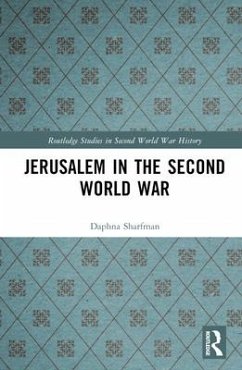This book is the first to present the unique story of the city of Jerusalem during the events of the Second World War and how it played a unique role in both the military and civilian aspects of the war.
Whilst Jerusalem is usually known for topics such as religion, archaeology, or the politics of the Israeli-Arab conflict, this volume provides an in-depth analysis of this exceptional and temporary situation in Jerusalem, offering a perspective that is different from the usual political-strategic-military analysis. Although battles were raging in the nearby countries of Syria and Lebanon, and the war in Egypt and the Western Desert, the people who came to Jerusalem, as well as those who lived there, had different agendas and perspectives. Some were spies and intelligence officers, other were exiles or refugee immigrants from Europe who managed at the last moment to escape Nazi persecution. Journalists and writers described life in the city at this time. All were probably conscious of the fact that when the war came to an end, local rivalry and mounting conflict would take the centre stage again. This was a time of a special, magical drawn-out moment that may shed light on an alternative, more peaceful, kind of Jerusalem that unfortunately was not to be.
This volume seeks to find an alternative approach and to contribute to the development of insightful research into life in an unordinary city in an unordinary situation. It will be of value to those interested in military history and the history of the Middle East.
Whilst Jerusalem is usually known for topics such as religion, archaeology, or the politics of the Israeli-Arab conflict, this volume provides an in-depth analysis of this exceptional and temporary situation in Jerusalem, offering a perspective that is different from the usual political-strategic-military analysis. Although battles were raging in the nearby countries of Syria and Lebanon, and the war in Egypt and the Western Desert, the people who came to Jerusalem, as well as those who lived there, had different agendas and perspectives. Some were spies and intelligence officers, other were exiles or refugee immigrants from Europe who managed at the last moment to escape Nazi persecution. Journalists and writers described life in the city at this time. All were probably conscious of the fact that when the war came to an end, local rivalry and mounting conflict would take the centre stage again. This was a time of a special, magical drawn-out moment that may shed light on an alternative, more peaceful, kind of Jerusalem that unfortunately was not to be.
This volume seeks to find an alternative approach and to contribute to the development of insightful research into life in an unordinary city in an unordinary situation. It will be of value to those interested in military history and the history of the Middle East.

